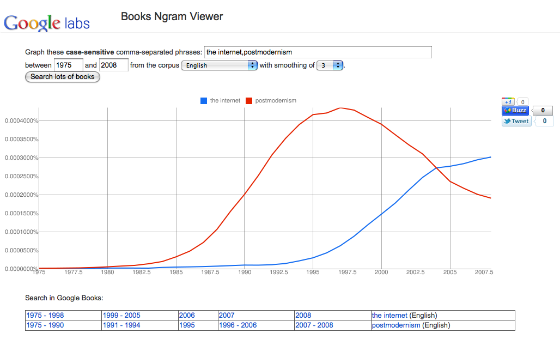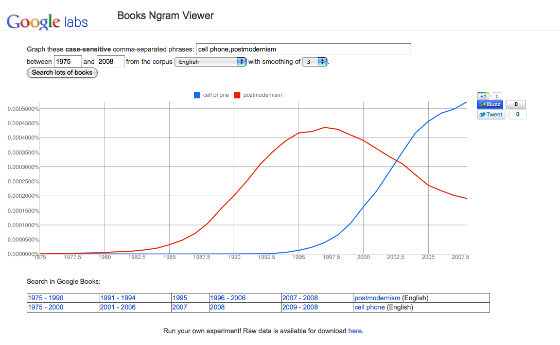Was Postmodernism killed off by the internet? The Guardian's Hari Kunzru suggests as much in a recent article tracing the arc of that much-debated, ill-defined cultural force, currently the subject of a major exhibition at London's Victoria & Albert Museum. It’s an odd idea, because it starts from a position of Postmodern supremacy: Kunzru’s argument is that the rise of the internet has made Postmodernism useless not by contradicting it, but by making its precepts conventional. As evidence, he offers a graph from Google's Ngram Viewer, plotting the incidence of the word “Postmodernism” in books since 1975 against that of the word “Internet.” Predictably, the graph shows Postmodernism's numbers rising to a peak in the mid-90s and declining as the new century approached, while the internet's figures begin an upward swing in the early 90s – coincidentally, around the time of its invention – that continues to the present day.
If there is truth to Kunzru's theory, it lies in the idea that our online experience embodies many of the underpinnings of Postmodernist theory. In the internet we find a system composed of innumerable narratives and voices, where information lacks fixed meaning and context is easily discarded. Our personas, too, are disposable, a patchwork of opinions and connections whose tethers to reality are in constant doubt. Relativism, plurality, decontextualization of information, destabilization of “reality” and identity: these are decidedly Postmodern concepts. In looking at the salient aspects of our online experience, then, we do indeed see Postmodernism in action, its tenets “made real by the internet.”
From there, however, his argument gets a bit flimsy. The graph, his sole piece of evidence, contributes nothing to the discussion, because the logical fallacy at work there is obvious: given his reasoning, one could easily produce evidence implicating cell phones, global warming, and Google itself as being responsible for Postmodernism's decline.
Equally problematic is the broadness of the language Kunzru uses. Postmodernism is infamous for being difficult to encapsulate, and its various manifestations often have little in common: the aesthetics and concerns of Postmodern literature, for instance, are a far cry from those of Postmodern Christianity. While the 1970-1990 timeline of the V&A exhibition reflects the vital years of Postmodernism as architecture and design, Kunzru himself cites 9/11 as the demise of Postmodernism as progressive philosophy. In dealing with such a slippery and complex phenomenon, useful examination requires a stated point of focus; an unqualified claim that “the internet killed off Postmodernism” is simply too imprecise to be meaningful.
Setting those issues aside, though, let's consider the central claim of the article: As Postmodernism has become “part of our everyday life” on the Net, its precepts have grown conventional and thus lifeless. Why? It seems to me that rather than eradicating Postmodernism, technologies like the internet have actually ensured its continued relevance – not as an avant-garde theory, but rather as a set of concepts whose demonstrable presence in and influence upon wider culture make it a source of insight.
Perhaps critical theory is prepared to move on, unable to discard entirely its search for progress and novelty. For the rest of us, though, postmodernism cannot help but continue: the tension between truth and simulacrum in our culture has never been more heightened, the role of plurality and relativism never more pronounced, the question of how we establish a sense of identity never more pertinent. Both online and off, postmodern concepts have evolved from mere philosophy to everyday realities, so it seems to me that declaring these ideas dead and tossing them aside now would make little sense. As a discourse that might point us to where our culture is headed, Postmodernism's time has probably passed; as a means of understanding where we are now, it remains very much alive.




{ 6 comments }
I wrote a paper on a similar topic back in March about how the internet is making postmodernism irrelevant as it provides a way to circumvent traditional power structures:
http://chromogenic.org/?p=516
Interesting paper, but it seems your conclusion has it almost exactly backwards.Â
Traditional power structures actually seem to be doing just fine. If anything, while we’re all busy polishing our own little corner of the simulacrum (playing Minecraft, liking cat videos, or whatever cos-play dérive may float our various boats) Capital and power are consolidating in the background, in a very real way and at a somewhat alarming rate.
If anything postmodernism is more relevant than ever. It’s cool that we have a lot more input in generating the play of surfaces, but we ignore the shifting undercurrents at our own peril. Online anonymity isn’t the New Freedom (just ask Bradley Manning) and network neutrality is far from a done deal.
hello there
i am currently writing an essay relating to this – about how the internet is making postmodernism irrelevant. I’d be really interested to read your paper on this for research. Would this be possible?
This is a cool Ngram that shows how internet’s becoming uncapitalized, but people still prefer their net with a big first letter:
http://ngrams.googlelabs.com/ngrams/graph?content=Internet%2Cinternet&year_start=1990&year_end=2011&corpus=0&smoothing=3
Relative usage of “the Net”, “cyberspace”, “World Wide Web”, and “the Web”: Â http://ngrams.googlelabs.com/ngrams/graph?content=the+Net%2Ccyberspace%2CWorld+Wide+Web%2Cthe+Web&year_start=1990&year_end=2008&corpus=0&smoothing=3
I added “website” to this one and it blows all the other ones away. I’m guessing it’s because we’ve become more focused on individual parts of the net rather than some behemoth web. http://ngrams.googlelabs.com/ngrams/graph?content=the+Net%2Ccyberspace%2CWorld+Wide+Web%2Cthe+Web%2C+website&year_start=1999&year_end=2008&corpus=0&smoothing=3
Comments on this entry are closed.
{ 2 trackbacks }